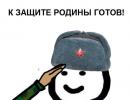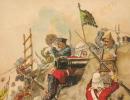Alexander Pushkin - Winter morning (Frost and sun; wonderful day): Verse. Analysis of Pushkin’s poem “Winter Morning” (1) Frost and sun, a wonderful day
19 459 0
4.1 / 5 ( 9 votes)
Reading the first stanza:
Frost and sun; wonderful day!
You are still dozing, dear friend -
It's time, beauty, wake up:
Open your closed eyes
Towards northern Aurora,
Be the star of the north!
Let's pay attention to lines 4-6. They contain not only "dark" words, although their obscurity may not be noticed, but also two now outdated archaic facts of grammar. Firstly, aren’t we surprised by the phrase “open your eyes”? After all, now you can only cast your gaze, direct your gaze, lower your gaze, but not open it. Here the noun gazes has the old meaning of “eyes.” The word gaze with this meaning is constantly found in artistic speech of the first half of the 19th century. The participle “closed” is of unconditional interest here. A short participle, as you know, is always a predicate in a sentence. But then, where is the subject to which it refers? In meaning, the word closed clearly gravitates towards the noun gazes, but it is (open what?) an undoubted direct object. This means “closed” is the definition of the word “gaze”.
But why then are they closed and not closed? Before us is the so-called truncated participle, which, like the truncated adjective, was one of the favorite poetic liberties of poets of the 18th - first half of the 19th centuries.
Now let's touch on one more word in this line. This is the noun "bliss". It is also not without interest. In S.I. Ozhegov’s dictionary it is interpreted: “Nega - i.zh. (obsolete) 1. Complete contentment. Live in bliss. 2. Bliss, a pleasant state. Indulge in bliss."
“The Dictionary of Pushkin’s Language” notes along with this the following meanings: “State of serene peace” and “sensual intoxication, pleasure.” The word bliss does not correspond to the listed meanings in the poem in question. In this case, it is best translated into modern Russian by the word sleep, since sleep is the most complete “state of serene peace.”
Let's go down a line below. Here, too, linguistic facts await us that require clarification. There are two of them. Firstly, this is the word Aurora. As a proper name, it begins with a capital letter, but in its meaning it acts here as a common noun: the Latin name of the goddess of the morning dawn names the morning dawn itself. Secondly, its grammatical form. Indeed, now after the preposition towards, the dative case of the noun follows and, according to modern rules, it should be “Towards northern Aurora”. And the genitive case is Aurora. This is not a typo or an error, but a now obsolete archaic form. Previously, the preposition towards required a noun in the genitive case after itself. For Pushkin and his contemporaries this was the norm.
Let's say a few words about the phrase “Appear as a star of the north.” The word star (of the north) here means the most worthy woman in St. Petersburg, and is not used in its literal meaning - a celestial body.
Second stanza
In the evening, do you remember, the blizzard was angry,
There was darkness in the cloudy sky;
The moon is like a pale spot
Through the dark clouds it turned yellow,
And you sat sad -
And now... look out the window:
Here we will pay attention to the words evening and darkness. We know that the word vecher means yesterday evening. In common usage, the word haze now means darkness, gloom. The poet uses this word to mean “thick snow, hiding everything around in the fog, like a kind of curtain.”
Third stanza
Under blue skies
Magnificent carpets,
Glistening in the sun, the snow lies;
The transparent forest alone turns black,
And the spruce turns green through the frost,
And the river glitters under the ice.
The third stanza of the poem is distinguished by its linguistic transparency. There is nothing out-of-date about it, and it does not need any explanation.
4th and 5th stanzas
The whole room has an amber shine
Illuminated. Cheerful crackling
The flooded stove crackles.
It's nice to think by the bed.
But you know: shouldn’t I tell you to get into the sleigh?
Ban the brown filly?
Sliding on the morning snow,
Dear friend, let's indulge in running
impatient horse
And we'll visit the empty fields,
The forests, recently so dense,
And the shore, dear to me.
There are linguistic “peculiarities” here. Here the poet says: “It’s nice to think by the couch.”
Analysis of incomprehensible words and expressions
Here the poet says: “It’s nice to think by the couch.” Do you understand this proposal? It turns out not. The word bed is bothering us here. A lounger is a low (at the level of a modern bed) ledge near a Russian stove, on which, while warming up, they rested or slept.
At the very end of this stanza, the word ban sounds strange and unusual instead of the normative, correct modern harness from the verb harness. At the time, both forms existed on equal terms, and, undoubtedly, the form “to ban” appeared here in Pushkin for rhyming as a fact of poetic license, which was determined by the word stove that stood above.
School years have never been simple or easy, and if you go to an all-girls school, that's the end of it. Lack of guys, a bunch of “rivals” and eternal competition in the rankings - this is what Midori High School consisted of. It was her that Midori Ki, that is, me, visited. I don’t know why my parents decided to send me here, but that’s where the problems started. Insulting nicknames based on name and hair color were the least of the problems. Constant clashes with classmates, setups and snitching were my headache. I don’t think it will surprise anyone that one day my patience ran out? It was after school, when most of the students went home. Four girls, my former classmates, decided to give me a dark one again. This time their goal was to cut off my hair while filming everything on camera. Then the cup of patience ran out. I could silently endure verbal abuse, hidden school supplies, and a scribbled desk, but physical harm? No. And I decided not to hold back, hitting the girls in the stomach with all my might. Excited teachers came running to the screams, and as soon as they saw the students lying around, they raised such a booth. And my parents were called to school for a serious conversation. That’s why I’m standing now in the director’s office, listening to his boring speech, which brought nothing but condemnation towards my mother and father. When blatant slander came my way, I did not remain silent: - Lies! Blatant lie! Everyone knows perfectly well who hid my textbooks, tore up my notebooks and drew on my desk! My father tried to calm me down by placing his hand on my shoulder, but I abruptly threw his hand away. To remain silent just because adults decided it was right? To hell! Even in sports they value honesty more than in this school! The director, a tall and neatly dressed man, jumped up from his leather chair. He slammed the table, as he always did whenever someone was brought to the mat for breaking the rules. This frightened many, I don’t argue, no one will be pleased when they start putting pressure on him. Especially the one you were taught to respect. - Enough! Will you have proof of your words, Midori-san? - Kimura-san asked harshly, straightening his rectangular glasses that had slightly slipped off the bridge of his nose. - Yes! - I shouted, ahead of my mother who opened her mouth. Reaching into the pocket of my school skirt, which I hate with all my heart, I pulled out my phone. I opened a gallery where the photographs were of all the masterpieces that my classmates left on my desk. “Cucumber”, “Tree”, “Cabbage”. “Who needs you? ", "Get out of school, ghost!", "Die!" The parents sighed, as they had already seen all this. But they only told me to be patient and assured me that everything would end soon. But it didn't stop. And it only became more dangerous. The girls became angry before our eyes, quickly turning to physical harm in their actions. First the hair, and then? I would get beaten up in the women's restroom. - Or should you turn on the recording of their conversations? Do you think that no one will understand who it is by his voice? Although, let me show you a video of how they break into my locker and steal things? What other evidence should I provide?! But, you know what? Fuck you and your fucking school! Turning around, I flew out of the office like a bullet, ignoring the order to go back. What difference does it make if by tomorrow morning I will no longer be a student at Midori Middle? Stupid formalities that only make life more difficult. Even if everyone knows the truth, until the court makes a verdict, nothing can be done. And the state needs all these rights and responsibilities to make it easier for them to control the people. Keep them in the country before the law. Running out of the school gates, I wandered to the sports ground, where I loved to play basketball with other people. Some were schoolchildren, some were students, there was no difference. Can you play? Then go ahead! Sometimes it was possible to play women's basketball, but quite rarely, because the girls did not always have time. Many of them went to two school clubs, and this took a lot of energy. The site was empty, although this was not surprising; all the guys were still busy with their duties. Throwing my bag with textbooks off my shoulder, I walked out to the center of the field. Extending my arms to the sky, I stretched with pleasure. A crunch was heard. - Let's start! - I cheerfully exclaimed, trying to bring myself to my senses. Exercise was probably my least favorite activity. Despite its great benefits, it was of no interest to me. The usual repetition of exercises learned from childhood, causing only boredom. Stretch your neck here, your hands and ankles there. Muscles here, ligaments there. Nudity! And so on for at least thirty minutes. Every day. Repeatedly. The weather was pleasant, which is not surprising, it was autumn. The rainy season had passed, so the weather was wonderful. And sitting in class this time is a nightmare for any teenager. - Ki-chan, hello! - the guy who sometimes joins our basketball game waved his hand at me, “You’re early today.” Wiping the sweat from my forehead with my wristband, I lowered my hands to my knees, bending over. Well-executed exercise is the key to success. “Hello, Yamamoto-kun,” she greeted her friend, smiling happily. “Call me by name, Ki-chan, I asked,” the baseball player said disapprovingly, while lowering his school bag onto the bench. “Okay, Takeshi,” I agreed, omitting the respectful suffix, “But in return, you stop calling me by that simple name.” And let's start already? You warmed up during your workout, right? That's wonderful! Yamamoto laughed, as he usually does when he doesn’t know what else to add to what has already been said. He picked up the ball and hit it on the floor a couple of times. Standing opposite me, he passed me across the floor, thereby signaling the start of the game. The creaking of a sneaker on the floor, the enemy's heavy breathing over your ear, long arms blocking movements. It was just as fun to play together as in a group. Except for his certain softness during the match, since, according to him, he “doesn’t hit girls.” I was distracted from my three-point shot by my mother’s voice, slightly angry and loud. Turning my head, I saw the mother with her hands strictly on her hips. She had a messenger bag hanging from her shoulder and a wide-brimmed hat on her head. She's always been weird. From her face, which I suddenly saw clearly, it was clear that a thrashing awaited me at home. She extended her hand, pointing with her index finger to the spot next to her. Such a subtle hint that they won’t let me rest. - Problems? - Yamamoto whispered, quietly placing his hand on his back. I shook my head, smiling tightly. What other answer can be given to this question other than “Fine”? - Nope, it's okay, relax! Well, I'm off. Taking my carelessly thrown bag and ball net, I threw them over my shoulder. The heavy bag hit my back painfully. There will be a bruise again. - See you tomorrow, Midori-chan! - Takeshi rushed after him. I walked towards the woman with great reluctance. And as soon as I caught up, she tenaciously grabbed my elbow. I was terribly ashamed in front of Yamamoto for this performance, but if I had not done so, a scandal would have started right on the street. This was just what I needed. The walk home was silent, and there wasn’t much conversation inside either. My father was sitting in the kitchen, holding a mug of coffee in both hands, as he usually did when I messed up. After all, he hates coffee, he can’t even stand warm chocolate. The mother, going to the cupboard with dishes, took a transparent glass and poured water from the tap. And similar manipulations occurred almost every week, starting when I entered Middle Midori. “You have achieved your goal, congratulations,” the father spoke first, taking a sip, “You will no longer attend classes at Midori High School.” Kimura-san agreed not to kick you out in disgrace, but to accept our voluntary resignation. Therefore, starting next Monday, you will become a student at Namimori Middle. “You understand,” the mother went on the offensive, tapping her well-groomed nails on the table, “That this is a complete failure?” The school is weak, and its reputation leaves much to be desired. I don’t know what you will do to enter the top universities in Japan in the future... Nodding at every word spoken, I dreamed of quickly going to my room and falling asleep. If I don’t do this, I’ll worry the rest of the time. Do I need it? Moreover, when the courses are tomorrow, and the assignment for them has not been completed. After a long monologue from my parents, I finally went upstairs. The steps seemed higher to me than usual, which is why I walked slowly. As soon as I got close to the bed, I immediately fell face first into the pillow. I realized that today was an exhausting day. But I think the sacrifices made will pay off in the end. The main thing is that I changed classes, and, I hope, I will never see my classmates again. Otherwise, who knows if I will be able to stop and not hit them one more time? Kami-sama, please, let there be a white streak in my life!..
Notes:
And let me remind you, for those especially gifted, that we are talking about the life of a teenager, not an adult. Therefore, the behavior, thoughts and conclusions she makes are hopefully age appropriate.
Enjoy reading! Rehei will be here soon.
“Winter Morning” Alexander Pushkin
Frost and sun; wonderful day!
You are still dozing, dear friend -
It's time, beauty, wake up:
Open your closed eyes
Towards northern Aurora,
Be the star of the north!In the evening, do you remember, the blizzard was angry,
There was darkness in the cloudy sky;
The moon is like a pale spot
Through the dark clouds it turned yellow,
And you sat sad -
And now... look out the window:Under blue skies
Magnificent carpets,
Glistening in the sun, the snow lies;
The transparent forest alone turns black,
And the spruce turns green through the frost,
And the river glitters under the ice.The whole room has an amber shine
Illuminated. Cheerful crackling
The flooded stove crackles.
It's nice to think by the bed.
But you know: shouldn’t I tell you to get into the sleigh?
Ban the brown filly?Sliding on the morning snow,
Dear friend, let's indulge in running
impatient horse
And we'll visit the empty fields,
The forests, recently so dense,
And the shore, dear to me.
Analysis of Pushkin's poem "Winter Morning"
Lyrical works occupy a very significant place in the work of Alexander Pushkin. The poet has repeatedly admitted that he is in awe not only of the traditions, myths and legends of his people, but also never ceases to admire the beauty of Russian nature, bright, colorful and full of mysterious magic. He made many attempts to capture a wide variety of moments, masterfully creating images of an autumn forest or a summer meadow. However, the poem “Winter Morning”, created in 1829, is rightfully considered one of the most successful, bright and joyful works of the poet.
From the very first lines, Alexander Pushkin puts the reader in a romantic mood, in a few simple and elegant phrases describing the beauty of winter nature, when the duet of frost and sun creates an unusually festive and optimistic mood. To enhance the effect, the poet builds his work on contrast, mentioning that just yesterday “the blizzard was angry” and “darkness rushed across the cloudy sky.” Perhaps each of us is very familiar with such metamorphoses, when in the midst of winter endless snowfalls are replaced by a sunny and clear morning filled with silence and inexplicable beauty.
On days like these, it’s simply a sin to sit at home, no matter how comfortably the fire crackles in the fireplace. And in every line of Pushkin’s “Winter Morning” there is a call to go for a walk, which promises a lot of unforgettable impressions. Especially if outside the window there are amazingly beautiful landscapes - a river glistening under the ice, forests and meadows dusted with snow, which resemble a snow-white blanket woven by someone’s skillful hand.
Every line of this poem is literally permeated with freshness and purity., as well as admiration and admiration for the beauty of his native land, which at any time of the year never ceases to amaze the poet. Moreover, Alexander Pushkin does not seek to hide his overwhelming feelings, as many of his fellow writers did in the 19th century. Therefore, in the poem “Winter Morning” there is no pretentiousness and restraint inherent in other authors, but at the same time, each line is imbued with warmth, grace and harmony. In addition, simple joys in the form of a sleigh ride give the poet true happiness and help him fully experience the greatness of Russian nature, changeable, luxurious and unpredictable.
The poem “Winter Morning” by Alexander Pushkin is rightfully considered one of the most beautiful and sublime works of the poet. It lacks the causticity so characteristic of the author, and there is no usual allegory, which makes you look for the hidden meaning in every line. These works are the embodiment of tenderness, light and beauty. Therefore, it is not surprising that it is written in light and melodic iambic tetrameter, to which Pushkin resorted quite often in those cases when he wanted to give his poems special sophistication and lightness. Even in the contrasting description of bad weather, which is intended to emphasize the freshness and brightness of a sunny winter morning, there is no usual concentration of colors: a snow storm is presented as a fleeting phenomenon that is not able to darken the expectations of a new day filled with majestic calm.
At the same time, the author himself never ceases to be amazed at such dramatic changes that occurred in just one night. It’s as if nature itself acted as the tamer of an insidious blizzard, forcing her to change her anger to mercy and, thereby, giving people an amazingly beautiful morning, filled with frosty freshness, the creaking of fluffy snow, the ringing silence of silent snowy plains and the charm of the sun’s rays shimmering with all colors rainbows in frosty window patterns.
Poems by A.S. Pushkin about winter - an excellent way to look at snowy and cold weather with different eyes, to see in it the beauty that gray everyday life and dirty streets hide from us. It was not for nothing that they said that nature has no bad weather.
Painting by Viktor Grigorievich Tsyplakov “Frost and Sun”
WINTER MORNING
Frost and sun; wonderful day!
You are still dozing, dear friend -
It's time, beauty, wake up:
Open your closed eyes
Towards northern Aurora,
Be the star of the north!
In the evening, do you remember, the blizzard was angry,
There was darkness in the cloudy sky;
The moon is like a pale spot
Through the dark clouds it turned yellow,
And you sat sad -
And now... look out the window:
Under blue skies
Magnificent carpets,
Glistening in the sun, the snow lies;
The transparent forest alone turns black,
And the spruce turns green through the frost,
And the river glitters under the ice.
The whole room has an amber shine
Illuminated. Cheerful crackling
The flooded stove crackles.
It's nice to think by the bed.
But you know: shouldn’t I tell you to get into the sleigh?
Harness the brown filly?
Sliding on the morning snow,
Dear friend, let's indulge in running
impatient horse
And we'll visit the empty fields,
The forests, recently so dense,
And the shore, dear to me.
Painting by Alexey Savrasov "Courtyard. Winter"
WINTER EVENING
The storm covers the sky with darkness,
Whirling snow whirlwinds;
Then, like a beast, she will howl,
Then he will cry like a child,
Then on the dilapidated roof
Suddenly the straw will rustle,
The way a belated traveler
There will be a knock on our window.
Our dilapidated shack
And sad and dark.
What are you doing, my old lady?
Silent at the window?
Or howling storms
You, my friend, are tired,
Or dozing under the buzzing
Your spindle?
Let's have a drink, good friend
My poor youth
Let's drink from grief; where is the mug?
The heart will be more cheerful.
Sing me a song like a tit
She lived quietly across the sea;
Sing me a song like a maiden
I went to get water in the morning.
The storm covers the sky with darkness,
Whirling snow whirlwinds;
Then, like a beast, she will howl,
She will cry like a child.
Let's have a drink, good friend
My poor youth
Let's drink from grief: where is the mug?
The heart will be more cheerful.
Painting by Alexey Savrasov "Winter Road"
Here is the north, the clouds are catching up... Here is the north, the clouds are catching up,He breathed, howled - and here she is
The winter sorceress is coming,
She came and fell apart; shreds
Hanged on the branches of oak trees,
Lay down in wavy carpets
Among the fields around the hills.
Brega with a still river
She leveled it with a plump veil;
The frost has flashed, and we are glad
To the pranks of Mother Winter.
Painting by Gustav Courbet "The Outskirts of a Village in Winter"
WINTER!... PEASANT TRIUMPHANT... (Excerpt from the poem "Eugene Onegin")Winter!.. The peasant, triumphant,On the firewood it renews the path;
His horse smells the snow,
Trotting along somehow;
Fluffy reins exploding,
The daring carriage flies;
The coachman sits on the beam
In a sheepskin coat and a red sash.
Here is a yard boy running,
Having planted a bug in the sled,
Transforming himself into a horse;
The naughty man has already frozen his finger:
He is both painful and funny,
And his mother threatens him through the window.
Painting by Isaac Brodsky "Winter"
WINTER ROADThrough the wavy mists
The moon creeps in
To the sad meadows
She sheds a sad light.
On the winter, boring road
Three greyhounds are running,
Single bell
It rattles tiresomely.
Something sounds familiar
In the coachman's long songs:
That reckless revelry
That's heartbreak...
Painting by Nikolai Krymov "Winter Evening"
IT WAS AUTUMN WEATHER THAT YEAR
That year the weather was autumn
She stood in the yard for a long time.
Winter was waiting, nature was waiting,
Snow only fell in January
On the third night. Waking up early
Tatiana saw in the window
In the morning the yard turned white,
Curtains, roofs and fences,
There are light patterns on the glass,
Trees in winter silver,
Forty merry ones in the yard
And softly carpeted mountains
Winter is a brilliant carpet.
Everything is bright, everything sparkles all around.
Painting by Arkady Plastov "First Snow"
WHAT A NIGHT! CRACKING FROST
What a night! Frost is bitter,
There is not a single cloud in the sky;
Like an embroidered canopy, a blue vault
Replete with frequent stars.
Everything in the houses is dark. At the gate
Locks with heavy locks.
People are buried everywhere;
Both the noise and the shout of the trade died down;
As soon as the yard guard barks
Yes, the chain rattles loudly.
And all of Moscow is sleeping peacefully...
Konstantin Yuon "End of Winter. Midday"
Frost and sun; wonderful day!
You are still dozing, dear friend -
It's time, beauty, wake up:
Open your closed eyes
Towards northern Aurora,
Be the star of the north!
In the evening, do you remember, the blizzard was angry,
There was darkness in the cloudy sky;
The moon is like a pale spot
Through the dark clouds it turned yellow,
And you sat sad -
And now... look out the window:
Under blue skies
Magnificent carpets,
Glistening in the sun, the snow lies;
The transparent forest alone turns black,
And the spruce turns green through the frost,
And the river glitters under the ice.
The whole room has an amber shine
Illuminated. Cheerful crackling
The flooded stove crackles.
It's nice to think by the bed.
But you know: shouldn’t I tell you to get into the sleigh?
Ban the brown filly?
Sliding on the morning snow,
Dear friend, let's indulge in running
impatient horse
And we'll visit the empty fields,
The forests, recently so dense,
And the shore, dear to me.
Analysis of the poem “Winter Morning” by Pushkin
The poem “Winter Morning” is a brilliant lyrical work by Pushkin. It was written in 1829, when the poet had already been released from exile.
“Winter Morning” refers to the poet’s works dedicated to the quiet idyll of village life. The poet always treated the Russian people and Russian nature with deep trepidation. Love for the Motherland and native language was Pushkin’s innate quality. He conveyed this feeling with great skill in his works.
The poem begins with a line known to almost everyone: “Frost and sun; wonderful day!” From the first lines, the author creates a magical picture of a clear winter day. The lyrical hero greets his beloved - “adorable friend.” The amazing transformation of nature that took place overnight is revealed through a sharp contrast: “the blizzard was angry”, “the darkness was rushing” - “the spruce is turning green”, “the river is shining”. Changes in nature, according to the poet, will definitely affect a person’s mood. He invites his “sad beauty” to look out the window and feel the splendor of the morning landscape.
Pushkin liked to live in the village, away from the noisy bustle of the city. He describes the simple everyday joys. A person needs little to be happy: a cozy house with a hot stove and the presence of his beloved woman. A sleigh ride can be a particular pleasure. The poet strives to admire the fields and forests so dear to him, to evaluate the changes that have occurred to them. The charm of a walk is given by the presence of a “dear friend” with whom you can share your joy and delight.
Pushkin is considered one of the founders of the modern Russian language. “Winter Morning” is one of the small but important building blocks in this matter. The poem is written in simple and understandable language. Iambic tetrameter, which the poet loved so much, is ideal for describing the beauty of the landscape. The work is imbued with extraordinary purity and clarity. The main means of expression are numerous epithets. The past sad day includes: “cloudy”, “pale”, “gloomy”. A real joyful day is “magnificent”, “transparent”, “amber”. The central comparison of the poem is dedicated to the beloved woman - the “star of the north.”
There is no hidden philosophical meaning in the poem, no omissions or allegories. Without using beautiful phrases and expressions, Pushkin painted a magnificent picture that cannot leave anyone indifferent.






